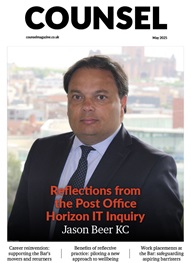*/
Direct access provides “huge opportunities” for the Bar in light of Clementi and the Legal Services Act but is currently under-used.
About 1,200 barristers are qualified to provide direct access—clients can instruct them directly without going through a solicitor—and about 800 barristers actually take part in the scheme.
Professor John Flood of Westminster University, who co-authored the report Straight there, no detours: direct access to barristers with Avis Whyte for the Bar Council’s Access to the Bar Day last November, says the scheme is under-used.
“This provides a golden opportunity to move forward in light of all the changes that are coming in with Clementi, but barristers are not as visible to the general public as solicitors. I think more needs to be done in terms of marketing and advertising on this. Barristers could be more entrepreneurial about it.”
Prof Flood said: “Clients thought it great value for money—they are paying for one lawyer instead of two.
“The rules do not always make it as easy as it could be, for example, barristers cannot write letters on chambers headed notepaper but must draft letters for the clients to use on their own notepaper.”
He said there is also scope to streamline the two routes of public access and licensed access—about 200 professional bodies have licences to instruct barristers—rather than have two routes side by side.
Marc Beaumont, co-Vice Chairman of the Access to the Bar Committee, said he hoped that the Access to the Bar Day “will create a ripple effect conducive to greater awareness of the opportunity for business clients and members of the public to come straight to the Bar, where it is appropriate to do so, and thereby substantially to reduce the cost of accessing legal services.”
Professor John Flood of Westminster University, who co-authored the report Straight there, no detours: direct access to barristers with Avis Whyte for the Bar Council’s Access to the Bar Day last November, says the scheme is under-used.
“This provides a golden opportunity to move forward in light of all the changes that are coming in with Clementi, but barristers are not as visible to the general public as solicitors. I think more needs to be done in terms of marketing and advertising on this. Barristers could be more entrepreneurial about it.”
Prof Flood said: “Clients thought it great value for money—they are paying for one lawyer instead of two.
“The rules do not always make it as easy as it could be, for example, barristers cannot write letters on chambers headed notepaper but must draft letters for the clients to use on their own notepaper.”
He said there is also scope to streamline the two routes of public access and licensed access—about 200 professional bodies have licences to instruct barristers—rather than have two routes side by side.
Marc Beaumont, co-Vice Chairman of the Access to the Bar Committee, said he hoped that the Access to the Bar Day “will create a ripple effect conducive to greater awareness of the opportunity for business clients and members of the public to come straight to the Bar, where it is appropriate to do so, and thereby substantially to reduce the cost of accessing legal services.”
Direct access provides “huge opportunities” for the Bar in light of Clementi and the Legal Services Act but is currently under-used.
About 1,200 barristers are qualified to provide direct access—clients can instruct them directly without going through a solicitor—and about 800 barristers actually take part in the scheme.


Please complete the Barristers’ Working Lives survey this month to help shape and prioritise the Bar Council’s work
Rachel Davenport, Co-founder and Director at AlphaBiolabs, discusses the company’s commitment to giving back to communities across the UK
By Kem Kemal of Henry Dannell
By Nick Bonnello and Aaron Young of RWB Chartered Accountants
By Kem Kemal of Henry Dannell
A comparison – Dan Monaghan, Head of DWF Chambers, invites two viewpoints
Animal sexual abuse is a distressing and taboo subject. Yet, write Christina Warner and Maya Badham, this hidden crisis, where legal, ethical and psychological factors converge, requires frank discussion
Maria Scotland and Niamh Wilkie report from the Bar Council’s 2024 visit to the United Arab Emirates exploring practice development opportunities for the England and Wales family Bar
Marking Neurodiversity Week 2025, an anonymous barrister shares the revelations and emotions from a mid-career diagnosis with a view to encouraging others to find out more
David Wurtzel analyses the outcome of the 2024 silk competition and how it compares with previous years, revealing some striking trends and home truths for the profession
Save for some high-flyers and those who can become commercial arbitrators, it is generally a question of all or nothing but that does not mean moving from hero to zero, says Andrew Hillier